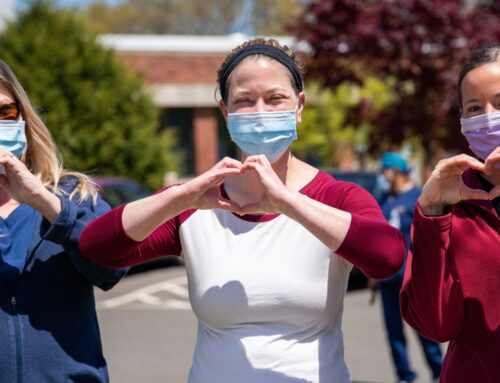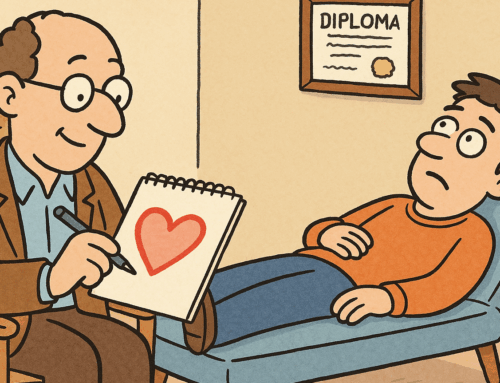Kindness in the Surgical Suite
“Whoso Keepeth His Mouth and His Tongue Keepeth His Soul from Troubles.”
-Proverbs 21:23
Written by: M.T. Bennett, M.S.
When you’re cutting into a cadaver and you sever a choice artery or nerve, expletives will fly. Such was the case in my anatomy lab one day. My tank mates and I stood around a stainless-steel table with a lifeless corpse whom we were systematically dissecting. After more than an hour of work separating the pathway of the vagus nerve one of my mates accidentally tore it. Foul expressions abounded at the lost work. I looked up from where I was working and proclaimed, “Dagnabbit!”.
My classmates laughed good-naturedly at my choice of words then one of them said, “Mason, I don’t think I’ve ever heard you say a swear word.”
“Well,” I replied, “that’s because I don’t curse. Actually, I don’t think I’ve ever said a swear word in my whole life.”
Jaws dropped; they had never heard of such a thing. As a teenager I endured lots of friendly teasing for my lack of four-letter words. I’ve noticed as I’ve grown older that people seem to respect clean language. This is what my tank mates did. They also began to apologize profusely for any poor language they have previously used around me. My response was, “No worries. I appreciate clean language but honestly, I’m busy enough trying to take care of myself I don’t have enough energy to police anyone else. You all talk how you want.”
After that I was known as a nice kid who never swore. People respected me for it. People saw me as a good person. Now, a few years later, I look back and wonder if we were all missing the point.
Unkind Words
While I don’t curse, there is a prevalent phenomenon of complaining in medical school. There are so many things wrong with medical education that one could write volumes. With so much to complain about, it is no surprise that medical students end up complaining…A LOT. On Twitter you can find dozens of medical student accounts, hiding behind anonymity to express displeasure. If you could be a fly on the wall in a study group, you would be surprised at the vehemence expressed by students. They voice their anger and discontent. There was a time during medical school where I, just like my fellow students, jumped feet first into the complaining.
We were mad at professors, mad at admin, mad at lectures, mad at crippling loans, mad at the whole system. I remember a student in my study group found out that someone in admin, who proctored our exams and controlled our grades, had a criminal record. My study group started complaining and gossiping in unkind ways.
I didn’t curse, but I did gossip and sometimes say unfair things about people behind their back. I was respected for my clean speech, but were my words really as good as I received credit for?
Mirrors for Ourselves
Kids are a great mirror for ourselves. My son repeats my words all the time. One day I was helping him clean a mess. My hand slipped and I made the mess worse. Instinctively I muttered, “Crap…”.
“Cwap?” a sweet little voice echoed, slightly slurring the R with a W, “Dada what’s crap? You said crap, what is crap?”
“Oh, I didn’t say that,” I lied, “I said… ‘Darn’”.
“No dada, you said crap.” my son retorted.
Well, here I was being a bad example to my son, and I was lying about it. I confessed that I said “crap” and explained what the word means, advising my son that we should try not to say it.
Another time I was driving, and someone pulled out in front of me. “Watch where you’re going!” I yelled, and then muttered, “What a doofus-head.”
“Doofus-head?” came a tiny echo in the car-seat behind me. “Dada, what is a doofus-head?”
None of these words are really that bad but it’s the intent of them and the example I was setting. It shows that kids are always listening. It also showed me that I wasn’t always saying the kindest things.
Good Examples
In some ways I don’t like the person I became in medical school; specifically jaded and cynical. I have found that the toxic habit of complaining did me no favors in school, it just made me mad and ruined my focus on the important things. I now try to distance myself from negative words and gossip. I’m not perfect, and sometimes I still contribute to the flood of complaining that happens when medical professionals congregate.
There are a lot of pressures in med school and life in general. Sometimes, at home, I found that I was quieter, maybe even shorter tempered, with those around me during times when my school stressors were more severe. At church I wasn’t very congenial. I went to my services, said cursory hellos to people I needed to, and mostly focused inside my own head on things I was studying or problems I had. I wasn’t a mean person, but I wasn’t as good as I could be.
Then I started my surgery rotation with Dr. P.
Surgery With Dr. P
During years three and four of medical school, students spend time with physicians in different specialties. Learning what they do, exploring different aspects of medical care, and preparing for our certifying exams. I’ve learned a lot about being a better person and physician from most of my preceptors. Each one of them deserves an article of their own. Dr. L taught me about charity and service, as well as Internal Medicine. Dr. W taught me patience, as well as Orthopedics. Dr. P taught me about kindness, as well as Surgery.
The stereotype is that one’s time in surgery will be stressful and that most surgeon preceptors are egotistical jerks. Dr. P did not fit that mold. He is a jovial man from Ghana with a smile that splits his whole face. He gave me a big hug on our first day and was peppy, bubbly, friendly, and happy. In the operating room he plays upbeat music and sings along, sometimes to the chagrin of the nurses. When we walked down hallways, he would make up raps about working hard and his family.
He introduced me to patients as his albino son, the hospital CEO, Captain Amazo, a shared hallucination, his bodyguard, and more. I visited a patient after their surgery and the patient told me he had been nervous for his procedure, but when he saw how happy his doctor was, and when Dr. P introduced me as Captain Amazo it made him laugh. It made him feel better about his impeding procedure. From then on that patient only called me Captain Amazo, and I didn’t mind.
I never once heard Dr. P say anything mean about someone else. He always gave people the benefit of the doubt. Once, before a tricky surgery, a patient expressed concerns about Dr. P’s ability to perform the surgery. The patient flatly said their concerns stemmed from the color of Dr. P’s skin. So, what happened when this patient was anesthetized, shirtless, and limp on a table, with Dr. P standing over him with a knife? Well, Dr. P did his best surgery and gave his best care afterwards. He was bothered by the patient’s perceptions, I saw him struggle with it, but he wanted to be a good person and help reverse the patient’s racist paradigm.
Dr. P said hello to EVERYONE. He asked them about their lives and was sincerely interested. He spoke to everyone like they were close friends. He prowled the hospital hallways looking for people to make smile. He would tease, he would joke, he would console, he would comfort.
In his clinic there are a lot of inspirational quotes hanging up. One of them succinctly expresses who Dr. P is. It says:
“Be a somebody
who makes everybody
feel like a somebody.”
Did he tell me when I was wrong? Yes. Did he point out my mistakes? Yes. Was he ever rude, condescending, or unkind about it? Nope. He was always sincerely trying to help me out and teach me. Students flocked to him to learn, we all loved him. Every day, when I went home Dr. P would say, “I know you’re studying very hard, but enjoy being with your family tonight too. Don’t neglect them.”
I saw other surgery preceptors banish their students to the corner of the room, with virtually no view of the table or procedure. The students were allowed to approach the table once the procedure was over and they could suture an incision or two. Not so for Dr. P, he had me gown up for every surgery. He wanted me right up to the table. Working with him, I learned a lot about surgery, I learned a lot about the kind of physician I wanted to be, and I learned a lot about the kind of person I want to be.
A Change in My Life
I made a goal to be more friendly at church. Not to rush home when it was over so I could nap or study, but to linger, talk, and make friends. I found myself smiling and saying hello to people in the hospital hallways. I spent more time talking with my family. I feel like my time with Dr. P made me a more positive, friendly, kind person.
I look at Dr. P and realize he truly is the good person that I had a reputation for being. The cleanliness of your language isn’t as important as the content. Sure, I don’t curse, while he lets squeak the very rare swear word. My words were clean, but the content wasn’t always kind. Dr. P always had uplifting content. He edifies people in his life and his work. I hope to follow his example and truly speak kind words to others.
This article originally appeared in Interfaith Now and has been posted here with permission.







